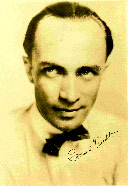
The Conrad Veidt Society
When shooting on CONTRABAND was completed, the plan was made by Veidt and his associates for Veidt to take a print of CONTRABAND to America to negotiate a deal to have the film edited and released in that country. The idea was that the proceeds from the American release of the film would go to the war effort in England.
While he was in New York, Conrad received an unexpected call from none other than
Louis B. Mayer of MGM studios, inviting him to accept a part in their upcoming production
of ESCAPE, a wartime anti-
Veidt immediately accepted the part, feeling that he would be returning to England eventually, and in the interim, work would help occupy his time. But unknown to Veidt, he would remain in the United States, never to return to England.
Conrad felt the offer from MGM was an amazing development, later stating,
"I was overjoyed at the opportunity to audition for the film ESCAPE. I would never have gotten the role or have even been considered for it if I hadn't already been in the United States at that particular moment, because the shooting on the film was to start almost immediately. Coming to America for the purpose of making arrangements for CONTRABAND was a stroke of luck for me!”
For the next three years until his untimely death in the spring of 1943, Veidt
worked continuously in films, mostly for MGM, but occasionally on loan to Warner
Bros. Almost everything he made during this period was a classic, from the well-
After the programmer THE MEN IN HER LIFE (1941), Conrad did better in the classic film ALL THROUGH THE NIGHT (1942). ALL THROUGH THE NIGHT was a classic Bogart film that featured a supporting cast that was a veritable "who's who" of 1930s and 40s supporting players. Several (including Phil Silvers and Jackie Gleason) went on to become household names on television. Many of the cast members would also pop up again months later in the filming of the now legendary CASABLANCA (1942).
In ALL THROUGH THE NIGHT, Veidt played the leader of a ring of Nazi spies who has
to stay on his toes constantly to avoid exposure by the affable, Damon Runyan-
NAZI AGENT (1942) gave Conrad a dual role in a cast that included character actor
Martin Kosleck and actress Ann Ayars as the love interest. Veidt played the role
of twins of German descent, one the leader of a ring of Nazis and the other a gentle
German-
Near the end of filming on NAZI AGENT, Conrad was offered the role of Major Strasser in CASABLANCA. After listening to a brief outline of the plot and a description of the fine cast being assembled, Conrad accepted enthusiastically.
Filming on CASABLANCA began on May 25, 1942, while Veidt was still working on NAZI AGENT. Thus, it wasn't until June 8, 1942 that Conrad had completed his scenes on NAZI AGENT and reported immediately to Warners to join production of CASABLANCA.
Much has been written about CASABLANCA, a film which has now become legend, if not folklore. Conrad Veidt's portrayal of Major Strasser, the villain of the piece, was nothing short of one of his finest portrayals. It was a brilliant combination of polished evil and an odd attractiveness which mostly female viewers have commented on. Veidt had an uncanny ability to inject a faint but discernable undertone of sympathy in his roles, however villainous.
In an article on CASABLANCA in the December 1991 American Heritage, writer/illustrator
Edward Sorel wrote, “The bright spot in the prevailing gloom was the German-
Also, although there are many colorful anecdotes about many of the cast members
of CASABLANCA in "behind-
This article and the title photo originally appeared in CULT MOVIES magazine, Issue #29, October 1999.
Conrad Veidt:
The Cinema's Master
of the Shadows
(Continued)